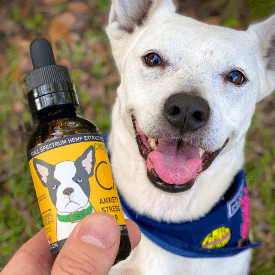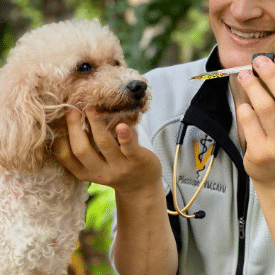CBD for Cushing’s Disease in Dogs

Cushing’s Disease in Dogs: Are there natural alternatives? If your pet has been diagnosed with Cushing’s Disease, or if you think that your pet may have Cushing’s, you’re in the right place.
When something is going on with your pet, it can be overwhelming to figure out the issue and get a diagnosis. It can be even more confusing to know how to treat it and keep your pet feeling their best. We’re here to help.
Inhaltsverzeichnis
What is Cushing’s Disease in Dogs?
Cushing’s Disease is an endocrine disorder, and is also known as hypercortisolism or hyperadrenocorticism. It causes your dog’s body to make too much of a hormone called cortisol. Cortisol is a hormone that helps control stress, weight, infections, and blood sugar. Too much cortisol, or too little, can wreak havoc on your pet’s overall wellbeing.
Cushing’s Disease in dogs usually occurs in middle-aged or older dogs. There are three types of Cushing’s Disease in dogs:
- Pituitary Dependent Cushing’s – Caused by a tumor on the pituitary gland, and is the most common type, occurring in 80-90% of animals with Cushing’s Disease.
- Adrenal Dependent Cushing’s – Caused by a tumor on the adrenal glands, and is the second most common, occurring in about 15% of animals with Cushing’s.
- Iatrogenic Cushing’s Syndrome – Caused by over-prescription of steroids, and is the least common type of Cushing’s.

What are the Symptoms of Cushing’s Disease in Dogs?
Many of the symptoms of Cushing’s Disease in dogs mimic the signs of aging, making them harder to identify. Symptoms of Cushing’s Disease in dogs include:
- Being thirstier than usual
- Excessive hunger
- Excessive urination and more indoor accidents
- Thinning skin
- Excessive panting
- Hair loss or hair growing more slowly
- Gaining a pot belly
- Seeming more tired or inactive
- Getting skin infections or skin growths often
Is Cushing’s Disease in Dogs Common?
Cushing’s Disease in dogs is fairly common, particularly in older dogs.
Cushing’s is more common in certain breeds of dog. Dog breeds prone to Cushing’s Disease include: Beagles, Boston Terriers, Boxers, Dachshunds, German Shepherds, Golden Retrievers, Labrador Retrievers, Poodles, and Terriers in general.
Diagnosing Cushing’s Disease in dogs can be a struggle and dogs are often misdiagnosed. If you suspect your dog has Cushing’s Disease, your veterinarian can do a blood test, an ACTH Stimulation Test, or a Cortisol-Creatinine Ratio Test. These tests will look for cortisol levels in the blood and urine, and are often used in conjunction with an ultrasound to make the final diagnosis.
CBD for Cushing’s Disease in Dogs
The traditional treatment for Cushing’s Disease in dogs is surgery to remove the tumor. Veterinarians may also prescribe hormone-regulating medications. However, surgery can be invasive and dangerous, especially in older dogs, and prescribed medications can cause additional side-effects.
Instead, natural alternatives can help your pet without the stress of surgery or liver-damaging medications.
Full spectrum CBD oil can help treat Cushing’s Disease in dogs by treating the hormonal imbalance, as well as shrinking, or even eliminating, the tumors causing the issue.
Primary benefits of using CBD for Cushing’s Disease in dogs:
- Targeting the tumors: Cancer cells do not die on their own; continuously spreading unless we do something to stop them. CBD was found to trigger apoptosis (natural cell death) in cancer cells. CBD also reduces the growth of tumors by preventing the formation of blood vessels that feed the tumor.
- Repairing hormonal imbalances: CBD works with the body’s endocannabinoid system to bring the body back to balance. This includes hormonal imbalances like the cortisol imbalance from the adrenal or pituitary glands.
- Relieving the symptoms: As CBD works with the endocannabinoid system to bring the body back to a balanced state, symptoms will naturally improve.
Administering CBD for Cushing’s Disease in Dogs
The most effective way to administer a full-spectrum CBD oil for Cushing’s Disease in dogs is through an oral tincture. Look for a Full-spectrum hemp extract with a high number of cannabinoids and active CBD. We recommend our HEAL: CBD Oil for dogs, which is an 1100mg Full Spectrum Hemp Extract.
Despite common misconceptions, dosing has very little to do with your pet’s size or weight. Finding the right dosage depends on your pet’s age and metabolism, their specific ailment, and other individual health factors.
Based on research and our experience, we recommend starting with 35-50 mg daily to treat Cushing’s Disease in dogs. Within that range we recommend you start low and adjust based on your pet’s response to determine your optimal dose. You may also find that your pet needs less as they recover over time.
For the fastest and best absorption, lift the lip and apply the dosage directly onto the gums. This is the most direct way into the bloodstream. You can also add it to food, but it can take significantly longer (30-45 minutes) to reach the bloodstream, as it works its way through the gastrointestinal system.
If Cushing’s Disease in your dog has also caused skin growths, you can also apply a topical Full-Spectrum Hemp CBD salve directly to the growth. Because dogs have endocannabinoid receptors in all three layers of their skin, topical CBD salves are extremely effective. We recommend REMEDY, our 300mg Full-Spectrum Hemp CBD Salve, to be applied twice a day until the growth is gone.
Research on CBD for Cushing’s Disease in Dogs
In a research study conducted by the A.B. Hancock Jr. Memorial Laboratory for Cancer Research, Vanderbilt Institute of Chemical Biology, Vanderbilt Ingram Comprehensive Cancer Center, and Vanderbilt University School of Medicine. In the study, researchers concluded that the effects of CBD are promising in the treatment of cancer and tumors.
Another recent study found that CBD inhibited the growth of cancerous cells in mice, as well as preventing future tumors. The conclusion of this study noted that CBD could be a viable option to treat tumors in both humans and animals.
Yet another research study conducted by the Department of Physiology, School of Medicine, at Southern Illinois University. There researchers found that CBD could have profound effects on the release of hormones, including cortisol.
Case Study: CBD for Cushing’s Disease in Dogs

Meet Potato! Potato is a 15-year-old Shih Tzu who came to Fire Flake Farm with many medical issues, including Cushing’s Disease. Potato’s owner was overwhelmed and unsure of how to best help Potato.
Potato was having mobility issues, joint pain, and more. When we groomed her, we found wart-like growths all over her body. We gave her a full-dose of HEAL – CBD Oil in the morning and evening. We also applied our REMEDY salve on her growths each day. Now, she is doing well, running around, upbeat, and acting younger than ever.
About Angela Ardolino

Angela Ardolino is a holistic pet expert who has been caring for animals for over 20 years. She operates a rescue farm, Fire Flake Farm, in Florida. She is also the owner of Beautify the Beast, a natural pet salon and shop. After getting her certificate in Medical Cannabis Biology and Therapeutic use from the University of Vermont School of Medicine, she founded CBD Dog Health . Her mission is to provide high quality, all-natural medical cannabis products designed specifically for pets.
Angela has seven dogs, Odie a 12-year-old mini-schnauzer, Nina an 8-year-old Doberman. Jolene a 7-year-old mutt, Maza a 7-year-old mutt, Rhemi an 8-year-old poodle, Potato a 15-year-old shih-tzu, and Miss Daisie a 15-year-old black lab. In addition, there are often 4-10 more at any time she is fostering or boarding. She uses Full Spectrum Hemp Extract on all her pets at her rescue farm every day, and has since 2016. Angela is a member of the Society of Cannabis Clinicians and the Veterinary Cannabis Association. She has trained hundreds medical doctors and veterinarians about the therapeutic uses of medical cannabis on animals. Visit www.angelaardolino.com for more information.







